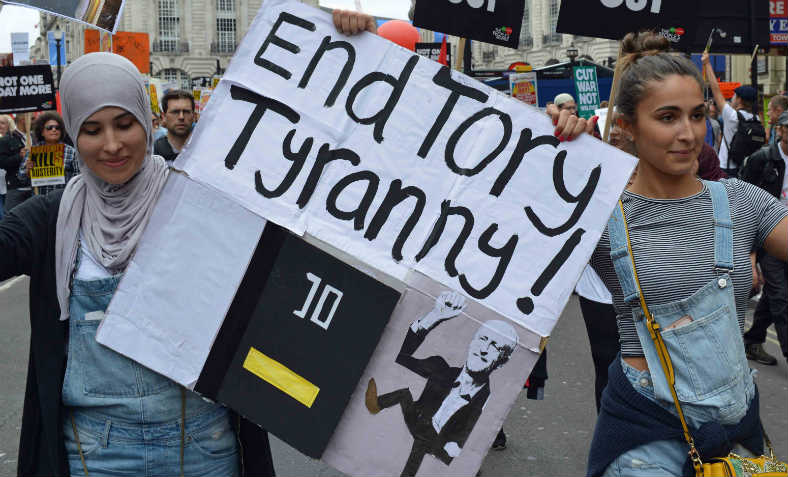 Not one day more demonstration, July 2017. Photo: Flickr/Julian Stallabrass
Not one day more demonstration, July 2017. Photo: Flickr/Julian Stallabrass
Labour needs to champion democracy to counter Boris Johnson and put forward a class-based approach to overthrow the government, argues Alex Snowdon
It can be difficult to see the wood from the trees in all the unfolding complications of the parliamentary process this week.
I disagreed, for example, with Labour abstaining on Boris Johnson’s proposal to hold a general election on 15 October. I won‘t recycle the arguments here as the case for Labour supporting an immediate election were effectively laid out in John Rees’ article, but it is worth keeping in perspective that this is in itself a tactical question of timing.
A general election will happen soon – it is a matter of when not if, and a matter of the exact process that gets us there. I can understand why so many people on the left think Labour got this one right. They have a different view of the best tactics to pursue, rather than rejecting a general election outright.
There is a bigger and deeper political issue though. There is a real tension in Labour over how to identify and position itself.
To what extent is it a radical opposition – and alternative – to the Tories, bridging the divides between Leave and Remain voters, seeking to unite people on the basis of shared opposition to nine years of disastrous Tory rule? To what extent is it, by contrast, a Remain party, focused largely on the Brexit debate and seeking to hoover up as many Remain voters as possible?
I feel strongly that the route to an election victory lies in Labour committing seriously to uniting people across the Brexit divide, fighting an election on a more radical and far-reaching version of the ‘For the many, not the few’ platform of 2017. A similar class-based approach is needed again, backed up by more radical policies.
The question of democracy fits into this context. Johnson is posing as the people’s champion, determined to implement the people’s will against an obstructive Remain parliament led by Corbyn.
Labour needs to counter that with the embrace of democracy. General election? Bring it on! Articulate a broader vision: let the people have their say about not just Brexit, but all political matters.
The party’s tactical error is precisely that it allows the Tories the moral high ground as the champions of democracy, while trapping Labour in what is framed as an obstructive parliament, viewed as being in alliance with smaller pro-Remain parties.
So that takes us back to the bigger picture. There is currently a risk of Labour appearing to care more about the Brexit timetable than the larger questions of British politics today. That is clearly not Jeremy Corbyn’s instinct – he relishes the prospect of an election and an opportunity to take the fight to the country at large. And a chance to kick the Tories out and chart a different course.
But there are different pressures pulling different ways, with parliamentary manoeuvres and pressure from MPs weighing heavily on what the leadership does.
The prospect of Johnson increasingly polarising the popular vote along Brexit lines brings risks for the Tories, but bigger risks for Labour. Johnson is prepared to gamble. He hopes to win enough Labour seats in Leave-majority areas to more than balance out some losses to SNP and Lib Dems.
Labour can only prevent that if it is clearly positioned as championing democracy including an election without delay, appeals to many Leave voters, and stands for more strident and far-reaching policy alternatives than in 2017.
The Tories are trying to neutralise the dangers they face: accusations of being against democracy, as well as difficult and unpopular issues like school cuts and austerity more generally. Sajid Javid’s spending review was all about detoxifying the Tory brand as architects of austerity, positioning the Tories as a party moving on from the economic policies of the Cameron and May eras.
The response has to be one that places Labour as unequivocal advocates of a democratic solution to the political impasse. It also means stepping up the class-based attacks on the Tories, what they represent economically (as the party of the rich) but also focusing on things like Johnson’s racism (the blistering Commons attack on Johnson’s Islamophobia by Tanmanjeet Singh Dhesi showed how it is done).
Above all, it requires a policy platform that goes well beyond rejecting austerity. Democratising measures, including in the economic field and in public services, are essential after four decades of neoliberalism. A wholly different vision of new public infrastructure and rebuilt public services, including a radical Green New Deal, has to be central.
An election will offer the opportunity to pursue this course – an opportunity that must be seized.

